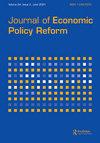年轻的民主国家和政府债务:来自南美的证据
IF 3.2
3区 经济学
Q1 DEVELOPMENT STUDIES
引用次数: 3
摘要
我检验了这样一种假设:当民主政体尚处于年轻阶段,或者仍然脆弱和不稳固的时候,政府债务往往会增加,可能是因为对再分配的需求增加,或者是为了收买选民,这样民主就会变得可以接受,成为“唯一的游戏”。我使用了1970-2007年期间所有南美年轻民主国家的样本,基于动态面板时间序列分析的结果表明,这些年轻的民主国家确实与更大的政府债务有关。此外,我还检验了一个假设,即当时即将卸任的独裁政权给年轻的民主国家留下了巨额政府债务。这一假设没有得到分析的证实。最后,没有证据表明,随着这些民主国家的成熟,政府债务往往会减少。鉴于我进行锻炼,即样品的性质,我使用的方法和反设事实我运行,而且总会有新的情节的民主化经历了世界各地的不同国家,和一些经济成功,其他的则并非如此,结果我报告信息的期望的政府债务在政治过渡到民主当特定机构还不到位。本文章由计算机程序翻译,如有差异,请以英文原文为准。
Young democracies and government debt: evidence from South America
I test the hypothesis that when democracies are young, or still fragile and unconsolidated, government debt tends to increase, presumably because of increased demand for redistribution, or to buy out the electorate, so that democracy becomes acceptable and “the only game in town”. I use a sample of all South American young democracies during the 1970–2007 period and the results, based on dynamic panel time-series analysis, suggest that those young democracies are indeed associated with larger government debt. Furthermore, I test the hypothesis that the outgoing dictatorships of the day bequeathed the young democracies with large government debt. This hypothesis is not confirmed by the analysis. Lastly, there is no evidence that, as those democracies mature over time, government debt tends to decrease. Given how I conduct the exercise, that is, the nature of the sample, the methodology I use and the counterfactuals I run, and also that there are always new episodes of democratisation being experienced by different countries around the world, with some being economically successful and others less so, the results I report are informative of what to expect in terms of government debt during political transitions into democracy when particular institutions are still not in place.
求助全文
通过发布文献求助,成功后即可免费获取论文全文。
去求助
来源期刊

Journal of Economic Policy Reform
Multiple-
CiteScore
6.60
自引率
0.00%
发文量
14
期刊介绍:
The Journal of Economic Policy Reform focuses on the analysis of economic policy reform. The journal draws upon what lessons can be learned from the successes and failures of countries undertaking reforms and how existing theories can be developed to shed light on positive as well as normative aspects of the reform process. The Journal of Economic Policy Reform encourages work from economists and political economy analysts on policies to promote growth and reduce poverty, intellectual property rights, aid versus trade, debt and debt relief, taxation and social security systems, surveys of key reform issues, as well as on corruption, democracy, emerging markets and the role of multilateral institutions.
 求助内容:
求助内容: 应助结果提醒方式:
应助结果提醒方式:


